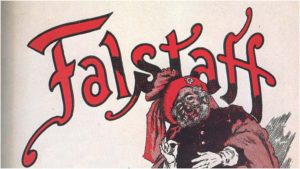
Opera Profile: Verdi’s Career Ends With A Joke – ‘Falstaff’
By Logan MartellIt all ends with a joke. After decades of dominating the opera world as a foremost melodrammatist, Verdi’s final opera is the complete opposite, a comedy.
“Falstaff,” which premiered on Feb. 9, 1893, was written by Arrigo Boito and is nothing like the other works Verdi had ever composed. He openly mocks his other works throughout. He tears down operatic structures he had championed throughout his life. The work is filled with sophistication and wit that doesn’t make it as accessible as some of his other, more popular works. And yet, for some, it might be his finest project ever.
Short Plot Summary
The opera begins in the Garter Inn, where bumbling knight Sir John Falstaff is accused of thievery by Dr. Caius. After Falstaff and his servants, Bardolfo and Pistola, are thrown out of the inn, Falstaff hatches a scheme to fatten his purse. He has penned two identical letters professing his love; one is to go to Alice Ford, while the other is meant for Meg Page. He plans to seduce the women and thus gain access to the wealth possessed by their husbands. When he orders his servants to deliver the letters, they protest on the grounds of their honor, prompting a disparaging aria from Falstaff on the uselessness of honor. When Alice and Meg compare the letters they have received from Falstaff’s page Robin, they quickly realize his ploy and resolve to gain the upper hand. Ford, Alice’s husband, has also been tipped off by Bardolfo and Pistola, thus the separate parties of men and women begin to formulate how they will turn the tables and take their revenge on Falstaff.
Bardolfo and Pistola are now in the service of Ford, though they convince Falstaff to forgive them for their past offenses. Mistress Quickly then arrives, bearing an invitation from Alice Ford so that Falstaff may arrive at her home between the hours of two and three, when her husband is out. Ford himself arrives at the inn disguised as a “Signor Fontana,” who also desires Alice. He bribes Falstaff to seduce Alice with a pouch of money, explaining that if Falstaff can overcome her, then Fontana will also be able to. Falstaff gladly accepts, mentioning that he has already received an invitation from Alice while her husband is away. When he leaves to change into better clothing, Ford is enraged to think his wife would actually have an affair with the fat knight Falstaff. Meanwhile, in Ford’s house, Alice notices that her daughter Nannetta seems dispirited. She explains that, rather than her lover Fenton, Ford plans to marry her off to Dr. Caius, who is many times older than her; the women promise Nannetta that this will not come to pass. When Falstaff arrives, he regales Alice with stories of his past deeds. Mistress Quickly announces that Ford has returned with a host of servants to catch his wife’s seducer. The women hide Falstaff in a large laundry basket as Ford turns his home inside out in the process of looking for him. When Alice has her servants throw the basket out the window, Falstaff is hurled into the River Thames, much to the delight of those assembled.
As Falstaff nurses his wounded pride with mulled wine, Mistress Quickly delivers another invitation from Alice. Although he rejects at first, he is swiftly persuaded to meet Alice in Windsor Great Park, dressed as Herne the Hunter, at precisely midnight. Ford and the others now plan the second part of their revenge. They will dress as supernatural creatures in order to frighten Falstaff, but within this plan Ford confides in Caius another intent: he intends to wed Nannetta, disguised as the Queen of the Fairies, to the old doctor, who will be dressed as a monk. Overhearing this, Mistress Quickly intends to stay one step ahead of Ford. When the hour of midnight has come, Falstaff’s next attempt to seduce Alice is interrupted by a procession of ghouls, spirits, and goblins, all of whom torment and beat Falstaff. The bumbling knight catches on finally when he recognizes a disguised Bardolfo, and admits that he has deserved the treatment he has received. Ford declares that a wedding will now follow; when Caius and Nannetta step forward, a second couple is disguise asks Ford to bless their union as well, to which he accepts. When Caius lifts the veil hiding Nannetta’s face, he instead finds Bardolfo; the second couple reveals themselves to be Fenton and Nannetta, now lawfully man and wife thanks to the unwitting Ford. When Falstaff sees he is not the only one who has been fooled this evening, he leads all assembled in singing to the folly of life and all those who play their part in it.
Famous Musical Numbers
The opera is rife with major musical quotations though none is more famous than the final fugue that end the opera. That fugue proclaims that all the world’s a joke and essentially ends the composer’s career on the most cheerful of notes, fitting for a man who composed dozens of tragedies.
Watch and Listen
This is, perhaps, one of the most famous performances of the opera featuring Renato Bruson in the title role under Carlo Maria Giulini. The rest of the cast features superstars as well.
Categories
Opera Wiki

